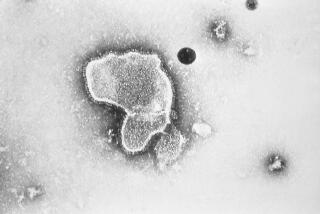Experimental genital herpes vaccine fails major clinical trial
An experimental vaccine designed to block genital transmission of herpes viruses from men to women has failed a major clinical trial aimed at obtaining manufacturing approval, researchers said Thursday. Because of the failure, the vaccine’s manufacturer, GlaxoSmithKline, said it will abandon any further attempts to develop the vaccine, called Simplirix.
The vaccine was designed to protect against the two major herpes simplex viruses, HSV-1 and HSV-2. HSV-1 is the primary cause of cold sores, while HSV-2 is the primary cause of genital herpes. The viruses can be transmitted through sexual or skin-to-skin contact, even when no lesions are apparent. About one in four women in the United States has genital herpes. Once in the body, the virus migrates to nerve cells, where it remains permanently. The virus can cause severe illness in infants born to HSV-infected women and is a risk factor for transmission of HIV. There is no cure and, with the new results, still no vaccine to protect against it.
The vaccine contains a glycoprotein from the herpes viruses, along with an adjuvant to increase the immune response. In an initial trial in men and women whose partners were infected with the virus, researchers found that the vaccine reduced genital herpes by 70% in women, but provided little benefit in men.
In the new trial, called Herpevac, 8,323 women between the ages of 18 and 30 received either Simplirix or Havrix, a vaccine that protects against hepatitis A. The subjects received the vaccine at entry into the study and again after one month and six months, then were followed for 20 months and evaluated for HSV infection and genital herpes disease. Subjects were also counseled on how to avoid HSV infection.
The National Institute of Allergy and Infectious Diseases, which co-sponsored the trial with GlaxoSmithKline, announced Thursday that the vaccine provided no more than 20% protection against infection, a level that was not statisticaly different from zero. Researchers do not yet know why the vaccine failed. Participants who received Simplirix will be offered the opportunity to receive Havrix, the agency said.
Further information about the trial is available here.
Thomas H. Maugh II / Los Angeles Times






